|
|
|
Sort Order |
|
|
|
Items / Page
|
|
|
|
|
|
|
| Srl | Item |
| 1 |
ID:
159041
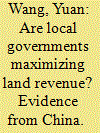

|
|
|
|
|
| Summary/Abstract |
This paper examines how political considerations affect local officials' revenue maximization behaviors in the context of urban land conveyance in China. Particularly, we analyze government intervention based on local officials' choice of two land auction types, namely, “English auction” and “two-stage auction”. The latter presumably serves as a tool of government intervention. We aim to address the research question: “Are local governments maximizing land revenue?” The major findings are threefold. First, for cities with higher housing prices, two-stage auctions are adopted more frequently than English auctions. In addition, land parcels in these “hot” cities adopt two-stage auctions more frequently during sensitive political events, suggesting that local officials respond positively to the real estate regulation policy from central government. Second, when city leaders are more incentivized to promote economic performance, they respond less positively to rises in housing prices. Third, such interventionist behavior results in a significantly depressed land price and housing price. Despite its intention of improving public welfare, this interventionism can susceptibly cause problems of misallocation and corruption.
|
|
|
|
|
|
|
|
|
|
|
|
|
|
|
|
| 2 |
ID:
113858
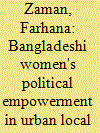

|
|
|
|
|
| Publication |
2012.
|
| Summary/Abstract |
Despite notably increased female involvement in local political bodies in Bangladesh, women continue to face multifarious problems in ongoing processes of shaping political institutions. Stereotypical gendered assumptions about divisions of labour continue to discourage such women from being present and active in the political arena. The article shows that this is not just a matter of Islamic traditionality. There are other factors at work, including lack of sensitivity to such issues among female leaders. Focusing on women ward commissioners, the study reveals specifically that they are frequently unable to show their commitment to the public as they are not assigned independent wards. When women share wards with male ward commissioners, their exposure becomes somehow insignificant to the public. Fieldwork confirms that women ward commissioners firmly believe that discriminatory attitudes of their male counterparts will continue unless they are given separate wards. This supports arguments for continued affirmative action at various levels to address gender balances in South Asian politics.
|
|
|
|
|
|
|
|
|
|
|
|
|
|
|
|
| 3 |
ID:
108222


|
|
|
|
|
| Publication |
2011.
|
| Summary/Abstract |
This article considers the ways in which sub-councils 'bring government closer to the people' by creating an intermediary level between local wards and the metropolitan council in Cape Town. Daily encounters between administrative staff, elected representatives and local communities within an impoverished formerly 'black' area demonstrate the intricacy of interactions and relationships between governing strategies from above and the tactics of the governed from below. Beyond conflicting objectives and rationalities, I argue that citizenship may be defined as a constant negotiation of legitimacy between stakeholders, never definitely trapped 'below' or 'above' the actual challenges of the city.
|
|
|
|
|
|
|
|
|
|
|
|
|
|
|
|
| 4 |
ID:
068330
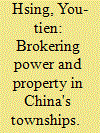

|
|
|
| 5 |
ID:
052287
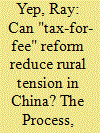

|
|
|
|
|
| Publication |
Mar 2004.
|
| Summary/Abstract |
This article questions the effectiveness and viability of the fiscal response to rural stability adopted by the Chinese state. Tax-for-fee reform (feigaishui) has been heralded as a possible solution to the cancer of excessive fiscal predation by local government. While the experiment may have achieved in relief of peasant burden, the success is simply based on central government financial sponsorship and is thus hardly sustainable as a national programme. And unless there is fundamental reform of fiscal redistribution, the new scheme will ironically hurt rather than help the poorest peasants. Putting all the blame on local cadres is politically expedient, but the central government needs to admit that the present crisis is a result of the systemic discrimination against peasants and the consequent deficit in financing rural governance. The ultimate solution entails a full-scale eradication of structural bias against the peasantry.
|
|
|
|
|
|
|
|
|
|
|
|
|
|
|
|
| 6 |
ID:
175401
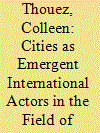

|
|
|
|
|
| Summary/Abstract |
Cities are fast becoming actors on issues of transnational import. This is also true in the field of migration governance where their scope of responsibility has traditionally been perceived as entirely domestic in nature. As mayors act and advocate transnationally on migration, they are supported by a growing web of intercity networks spanning knowledge sharing, to lobbying, to operational work. In parallel, cities’ agency is rising as they begin to acquire access and influence in interstate deliberations and decision-making fora. Their active presence impacts policy instruments like the UN Global Compact for Migration and Global Compact on Refugees, and policy frameworks like the Global Forum on Migration and Development. In turn, as cities provide more information on challenges faced locally, we may expect more pragmatic approaches to migration. This article outlines this expansion of cities’ agency and what it could mean for international migration governance.
|
|
|
|
|
|
|
|
|
|
|
|
|
|
|
|
| 7 |
ID:
094911


|
|
|
|
|
| Publication |
2010.
|
| Summary/Abstract |
Local governments can have a large effect on carbon emissions through land use zoning, building codes, transport infrastructure investments, and support for transportation alternatives. This paper proposes a climate policy instrument - city carbon budgets - that provides a durable framework for local governments to reduce greenhouse gas emissions. Local governments would be assigned an emissions "budget", and would be required to keep annual local transport and buildings emissions within this budget. This policy framework could be implemented and managed by a higher-level government, or might be used in awarding funds to developing country cities from international climate funds. The state of California has enacted a version of this policy. In this paper, we identify and evaluate options for creating an effective and acceptable institutional structure, allocating emission targets to localities, measuring emissions, providing flexibility and incentives to local governments, and assuring compliance. We also discuss the likely costs of such a policy.
|
|
|
|
|
|
|
|
|
|
|
|
|
|
|
|
| 8 |
ID:
165526


|
|
|
|
|
| Summary/Abstract |
In a developing country like Bangladesh, the devolved local government system is widely recognized as one of the key institutional forms for the citizen-centric public service delivery system and ensuring democratic governance at the grassroots level. However, the democratic nature of local governments and their effective role in rendering services are contingent upon the political and institutional environments of the country. Competitive electoral process is key to local democratic governance. The purpose of this article is to analyze the implications of contemporary political order and institutional environments for the proper functioning of the Union Parishad (council), the lowest tier of the local government system in Bangladesh. More specifically, this study will reflect on how political clientelism, partyarchy and institutional environments have stymied competitive electoral politics at the local level which may result in democratic backsliding.
|
|
|
|
|
|
|
|
|
|
|
|
|
|
|
|
| 9 |
ID:
076874


|
|
|
|
|
| Publication |
2007.
|
| Summary/Abstract |
This article evaluates the first four years of decentralized local governance in Malawi with special focus on accountability of local assemblies. The article mainly relies on primary sources such as newspapers, governmental and non-governmental reports and a comparative literature survey. We argue that decentralized local governance in Malawi has enhanced corruption among the local assemblies in relation to their election, awarding of contracts and other related acts. This has consequently led to, inter alia, financial mess in local assemblies, loss of citizen and donor trust as well as low-quality infrastructures. Meanwhile, the democracy and good governance that were envisaged in the creation of local assemblies through the Local Government Act 1998 and the Malawian constitution have seriously been undermined
|
|
|
|
|
|
|
|
|
|
|
|
|
|
|
|
| 10 |
ID:
141668
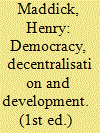

|
|
|
|
|
| Edition |
1st ed.
|
| Publication |
Bombay, Asia Publishing House, 1963.
|
| Description |
xii, 305p.pbk
|
|
|
|
|
|
|
|
|
|
|
|
Copies: C:1/I:0,R:0,Q:0
Circulation
| Accession# | Call# | Current Location | Status | Policy | Location |
| 008832 | 352.007/MAD 008832 | Main | On Shelf | General | |
|
|
|
|
| 11 |
ID:
188940


|
|
|
|
|
| Summary/Abstract |
Recent research on the informal sector has devoted considerable attention in examining how informal traders have been affected by the coronavirus in different temporal and spatial settings. However, less well understood is the extent to which central and local governments can cunningly use the veil of COVID-19 pandemic to regulate and re-shape the informal sector. Seeking to remedy this shortcoming in the prevailing accounts and utilising a qualitative research methodology including observations, discourse analysis, critical review of policy pronouncements, by-laws, legislation, video evidence from city officials, government, health authorities, vendors associations, newspapers articles and through a case study analysis of Harare City in Zimbabwe. The article contributes to the academic and policy discussions on how law, disease outbreak, policy and governmentality of African urban spaces intersect.
|
|
|
|
|
|
|
|
|
|
|
|
|
|
|
|
| 12 |
ID:
114780
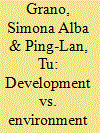

|
|
|
|
|
| Publication |
2012.
|
| Summary/Abstract |
This article presents a case study dealing with the controversy surrounding the construction of an alternative road connecting Danshui with Taibei City. The study serves to elucidate what the key influences are that govern environmental power dynamics between different agents in Taiwan and how these multiple levels of interaction are negotiated by the various players. The authors argue that although environmental policies are, for the most part, mandated from the top, at the local level their implementation can be bypassed, altered or stalled by these various agents.
|
|
|
|
|
|
|
|
|
|
|
|
|
|
|
|
| 13 |
ID:
138495


|
|
|
|
|
| Summary/Abstract |
This paper examines the extent to which Thailand’s current general or equalization grant program has helped reduce local fiscal disparity. Theoretically, the general grant transfers ought to be inversely related to local revenue-generating capacity. However, based on the 2010–2012 local government financial data from Khon Kaen province, this paper finds that local jurisdictions with high fiscal capacity and income per capita tend to receive more equalization grant per capita than the fiscally and economically disadvantaged localities. Descriptive statistics, the Gini coefficients, and fixed-effects econometric model are used to examine the relationship between general grant transfers and local fiscal capacity.
|
|
|
|
|
|
|
|
|
|
|
|
|
|
|
|
| 14 |
ID:
117779
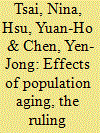

|
|
|
| 15 |
ID:
137535
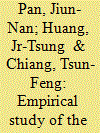

|
|
|
|
|
| Summary/Abstract |
The purpose of this study is to explore an important issue concerning the relationship among the local government deficit, land finance and real estate markets in China. This study uses a panel data of 30 provinces in China during 1999–2010 to estimate the panel smooth transition regression model. Since the estimated transition threshold value is 14.62, provinces with the ratio of fiscal deficits to GDP of greater than 14.62% are categorized as in the high fiscal difficulty (HFD) regime. Otherwise they are in the low fiscal difficulty (LFD) regime. The primary finding of this study is that the land leasing fee has a significantly positive influence on the total value of commodity buildings sold in the LFD regime. In addition, the local fiscal deficit has a significantly positive impact on the real estate market in the LFD regime, but this impact turns to be negative in the HFD regime.
|
|
|
|
|
|
|
|
|
|
|
|
|
|
|
|
| 16 |
ID:
156529


|
|
|
|
|
| Summary/Abstract |
In the wider context of growing digitalisation in South Asia, this article examines the impacts of a public–private–people partnership (4Ps) information and communication technology (ICT) initiative of the Bangladesh government, administered through local governmental offices, the Union Information Service Centre (UISC). Scrutinising the operation of six UISCs in rural communities across Bangladesh, the study researches the potential of ICTs to influence existing asymmetrical power relations and empower local people. Asking to what extent ICTs enable more people to actively participate in their communities and what the implications for empowerment are, it is found that top-down ICT intervention by itself cannot bring substantial change for people at the bottom of the social pyramid. Asymmetrical power relations continue to deprive marginalised groups from receiving the claimed benefits of ICT facilities. The study suggests the need for a more critical, practice-focused understanding of relationships between ICTs and rural empowerment, while also highlighting the changing modalities of connecting states and their citizens in postmodern South Asia.
|
|
|
|
|
|
|
|
|
|
|
|
|
|
|
|
| 17 |
ID:
138267


|
|
|
|
|
| Summary/Abstract |
While devolution has provided a stronger political voice for Scotland, Wales and Northern Ireland since the late 1990s, it is only in the past few years that English public opinion appears to have become exercised by the lack of similar arrangements for England. The renewed debates over the character of the Union after the Scottish independence referendum reveal a desire for ‘fair treatment’ of England within a Union conceived as a partnership of equals. At the same time, numerous proposals have been made for devolution of power within England, reflecting long-held concerns about the territorial hegemony of London. Solutions to the former issue include English votes for English laws and an English Parliament. Solutions to the latter include city-regions, strengthened local government, the first of these appears to be the government's preferred route, in the light of the recent ‘Greater Manchester Agreement’. However, none of these ‘solutions’ can count on being implemented.
|
|
|
|
|
|
|
|
|
|
|
|
|
|
|
|
| 18 |
ID:
150062


|
|
|
|
|
| Summary/Abstract |
Local government in Australia has a strong collective capacity to reduce GHG emissions through policies, funding allocation to renewable energy projects and the delivery of programs and services. This study examines the institutional capacity of councils in Sydney and how this impacts on decisions to invest in alternative energy projects. We find greenhouse gas emission targets of councils are strongly aligned to national targets but do not reflect the local council's institutional capacity, political leadership or strategic priorities. Energy reduction projects are often identified and undertaken by environmental staff without support from financial staff or financial-evaluation tools. An absence of national guidelines to provide consistency in tracking and reporting limits cross-sector benchmarking. Street lighting contributes to a significant proportion of council's total electricity expenditure and GHG emission profile. Being highly regulated, existing contracts and the current practice of street lighting services limits the councils’ ability to reduce emissions. Based on our analysis we recommend a number of measures to overcome these constraints including the use of financial evaluation tools for small-scale renewable energy projects, a standardised national tracking and reporting platform to facilitate progress-reporting and meaningful comparative analysis between councils and policy reform to the regulation of street lighting.
|
|
|
|
|
|
|
|
|
|
|
|
|
|
|
|
| 19 |
ID:
127685


|
|
|
|
|
| Publication |
2011.
|
| Summary/Abstract |
Considering the importance of good governance, the article explores the governance situation of the lowest local government tier (Union Parishad) in Bangladesh. Through the application of four good governance indicators-leadership, people's participation, transparency and accountability and equity-the expectation is that the findings would add a new dimension to the existing knowledge of local governance. Based on empirical data collected from the field, the study findings suggest that the governance situation at the local level is not conducive for the establishment of good governance and strong local democracy in the country. Despite incorporation of different provisions (ward shava, open budget, citizen charter and right to information) in the Local Government (Union Parishad) Act of 2009, the government has failed to ensure participation, accountability, good governance and transparency. Against this backdrop, the governance of local government bodies has been characterised by reluctance of local government leaders in ensuring development, lack of people's participation, transparency and accountability and unequal distribution of services.
|
|
|
|
|
|
|
|
|
|
|
|
|
|
|
|
| 20 |
ID:
171526
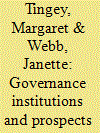

|
|
|
|
|
| Summary/Abstract |
UK Local Authorities are increasingly declaring ‘climate emergencies’ and pledging 100% clean energy and carbon neutrality ambitions for their locality, despite lack of powers over energy systems. Our research investigates current Local Authority engagement in clean energy, and considers prospects for meso-scale innovation. The analysis allocates Local Authorities to one of four categories of engagement, from energy ‘laggards’ through to ‘leaders’, based on their energy plans and investments. Findings reveal that, despite lack of direct powers, a high proportion of Local Authorities have developed sustainable energy plans and projects, but only a minority manage to combine these into a more strategic local programme. There was proportionately greater activity in Scotland and considerable variation was found across English regions. We conclude that variation in levels of engagement relates to authority size and divisions of responsibilities between different levels of government. The capacity for Local Authority-mediated social innovation to support development of a clean UK energy system is discussed. Implications for policy include the need for a statutory power, and commensurate resources, for Local Authorities, to ensure a more comprehensive and systematic contribution to clean energy innovation.
|
|
|
|
|
|
|
|
|
|
|
|
|
|
|
|
|
|
|
|
|